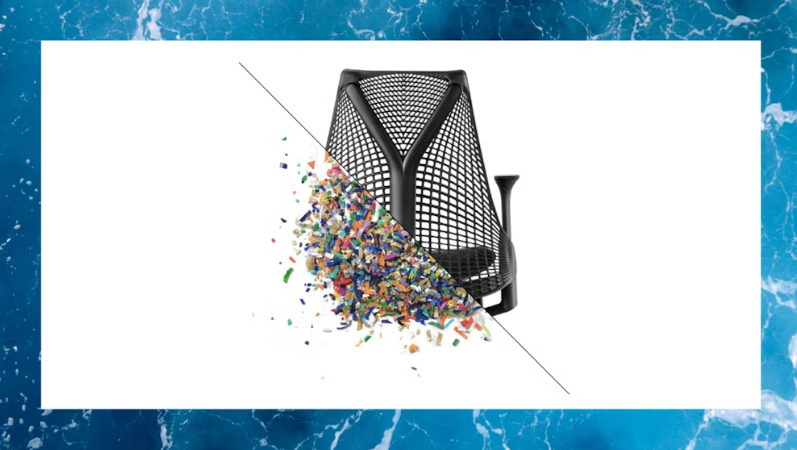The Green Revolution: Sustainable Design Trends in Commercial Interiors for 2024
Photo: Entertainment Tonight
Earth Day has been celebrated on April 22nd since 1970, it is a time to reflect on our impact on the environment and explore ways to embrace sustainability in every aspect of our lives. In the commercial design industry, 2024 is shifting towards more eco-conscious designs. According to the World Economic Forum, approximately 40% of solid waste in the United States comes from construction and demolition activities. As the demand for sustainable solutions grows, manufacturers are answering the call through eco-friendly, and efficient designs. Learn with us as we dive into some furniture manufacturers and how they are leading the charge in sustainable design for 2024:
1. Millerknoll:
A merger of two industry giants, Millerknoll combines Herman Miller's commitment to sustainability with Knoll's innovative design approach to improve both spaces and our planet. With products that prioritize both aesthetics and environmental responsibility, Millerknoll offers a diverse range of sustainable furniture solutions for work environments. When the collective of brands came together in 2021, they came with a different point of view all to make the future of design more sustainable for clients, the community, and the planet. MillerKnoll has taken the steps to do more for our planet by engaging the entire community in their sustainable practices such as eliminating plastic water bottles at all facilities reducing single-use plastic in packaging by 30% to and engaging in Maersk ECO delivery to replace fossil fuel with green fuel. The collective brands have designed products to be easily disassembled and recycled at the end of life. For example, the Ever Sofa by NaughtOne is the brand’s first upholstered product made to be easily disassembled and recycled at the end of life. The collective’s tradition of designing a greener world is evident as their 2030 goals continue to inspire more sustainably manufactured products such as Herman Miller’s Eames Molded Plastic Chair. As of 2022, the Eames Molded Plastic Chair is being made using 100% post-industrial recycled plastic.
2. Geiger:
Geiger, part of the MilerKnoll collective, specializes in high-quality wood furniture crafted with sustainability. With a focus on responsible forestry practices and minimal environmental impact, Geiger offers timeless designs that prioritize both aesthetics and eco-friendliness. Collaborating with the Environmental Protection Agency and its chemical suppliers, Geiger initiated the development of water-based top-coat materials in the mid-1990s. By 1998, they transitioned to water-based stains and sealants, making Geiger one of the pioneering furniture manufacturers globally to do so. This switch not only removed solvent-based materials and their associated VOCs from their processes, maintaining top-notch finishes for their products, placing Geiger on the path to becoming a leader in sustainable manufacturing.
3. DIRTT:
DIRTT stands out in sustainable construction and interior solutions in a big way. When your needs shift, DIRTT's adaptable system enables immediate, simple, and cost-efficient adjustments to your space, avoiding the need for demolition. By continually repurposing elements of your environment, you safeguard your investment, allowing for future reconfigurations and moves while minimizing landfill waste. DIRTT’s flexible system is engineered for disassembly, reducing the carbon footprint associated with both initial construction and subsequent modifications. With the multi-trade prefabrication construction system, your space is meticulously manufactured and pre-assembled at DIRTT's facilities, optimizing material usage, minimizing offcuts, dust, or waste, and ensuring a clean and efficient construction process.
4. Global:
Global is another industry leader in sustainable furniture design. When you think Global, think green. Global’s environmental commitment is seen throughout their manufacturing process. For example, eliminating the use of CFCs (Chlorofluorocarbons) and HCFCs (hydrochlorofluorocarbons) in all their manufacturing processes to protect the ozone layer. They utilize powder coat paint finishes, employing an electrostatic process that reclaims and reuses 99% of overspray without any solvents or CFCs. Of course, with the number of textiles used in our industry, Global is known to turn scrap into style with their partnership with Echoes in the Attic where they use textile scraps in their product designs from handbags to pillow designs, thus promoting reuse and restyling of fabrics. Global believes that they have a responsibility to protect the environment in all possible ways. Through their End-of-Life Program, they have been able to redirect their products to national/international programs for appropriate life cycle management instead of landfill disposal. Their product line not only prioritizes ergonomic functionality but also demonstrates environmental responsibility through a diverse array of eco-friendly offerings.
5. OFS:
OFS prioritizes sustainability, offering eco-conscious furniture solutions ideal for environmentally friendly commercial interiors. Their commitment to sustainable design is apparent in the introduction of two new fabrics, Allure and Roam, both made with Repreve recycled fiber. Each yard of Allure fabric incorporates 31 recycled bottles, while Roam contains 21 recycled bottles. OFS has also partnered with One Tree Planted to contribute to global reforestation efforts. Tree planting stands as the foremost solution to combatting climate change. Through this partnership, OFS can plant sufficient trees to counterbalance Greenhouse Gas emissions. These emissions encompass their building electricity and natural gas consumption, as well as transportation fuel usage for Styline and all company-owned vehicles.
As we celebrate Earth Month in April, it’s important to consider the environmental impact of our design choices. The shift towards sustainable design trends in commercial interiors for 2024 reflects a growing awareness of our responsibility to protect the planet. By choosing manufacturers like Millerknoll, DIRTT, Global, OFS, and Geiger, businesses can not only create aesthetically pleasing work environments but also contribute to a greener, more sustainable future. Let’s continue to prioritize sustainability in every aspect of our lives, starting with the spaces where we work and thrive.
These are only a highlight of the trends we’ve observed, what other trends are you seeing in sustainable design?






